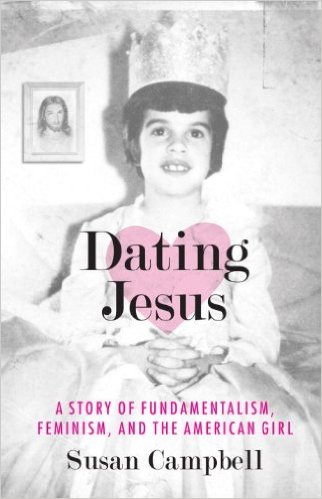‘Christ-Haunted’: Wolfgang Reviews Susan Campbell’s Autobiography
Peter Wolfgang’s review of Susan Campbell’s autobiography Dating Jesus originally appeared on August 27, 2013 on the now-defunct website of Hartford Faith and Values. We have reproduced it here because of its significance to the history of FIC under Wolfgang’s leadership.
The haunting of Susan Campbell
“You want Christ-haunted?”
Who? Me?
 It is Susan Campbell, a former columnist for The Hartford Courant, who is asking the question in her 2009 spiritual autobiography Dating Jesus: A Story of Fundamentalism, Feminism and the American Girl.
It is Susan Campbell, a former columnist for The Hartford Courant, who is asking the question in her 2009 spiritual autobiography Dating Jesus: A Story of Fundamentalism, Feminism and the American Girl.
The question is addressed to her readers, of course. But it is understandable that when I happened across Dating Jesus at Niantic’s Book Barn this summer I thought the last chapter (“Jesus Haunts Me, This I Know”) was directed at me.
I was the one who first used Flannery O’Connor’s colorful phrase to describe Susan Campbell’s spiritual state, in a 2006 Family Institute of Connecticut Blog post responding to one of her many ad hominem attacks on supporters of traditional marriage.
There is, unsurprisingly, no mention of my blog post in Campbell’s “About My Sources” section. But the last chapter does include this jaw-dropping parenthetical:
“And so my column is devoted quite a lot to same-sex marriage and I am a frequent topic of discussion (I hesitate to say “target,” because honestly? Most of the people who disagree with me are reasonable about it) on Connecticut-based blogs.”
It is nice of Campbell to admit, after the fact, that her pro-family critics were reasonable after all. She never said so in her Courant columns, where we were frequently portrayed to our friends and neighbors as people who hate gay folks and wish to foment violence against them.
But that’s the thing about Dating Jesus. It’s the same Susan Campbell you have read for years in The Courant and yet it’s not.
The book inadvertently confirms that Campbell extrapolated her 1970’s Missouri hillbilly background onto 21st Century Connecticut in ways that don’t fit. Yet it also holds hints of a dawning self-awareness that was usually absent from her columns.
So, for instance, Campbell writes of the fundamentalist church of her childhood that “they will marry Christians and beget Christians and not some namby-pamby type, either, but fire-breathing and soul-growing Christians, members of the church of Christ, saved by grace and fired with an obstinate belief in the black and white.”
One gets the impression that Campbell thought those were the only two options and, later in life, opted for namby-pambyism. But she seems partly aware of it. “The treacly sweet love of God coats everything here like cotton candy, and I hate myself for thinking that way,” she writes of her brother’s church, which she visits as an adult.
As a child, Campbell bested her Sunday School teacher in a disagreement over women’s ordination and realized, in her words, that he “is trained in Bible, but I am schooled in rhetoric.”
One wonders if Campbell knows the difference between being schooled in rhetoric and being merely argumentative. The last time I sparred with her it was over a blog post in which I expressed regret that The Courant might drop her column. But in chiding my fellow conservatives for being happy over “the demise of these columnists” when I should have written “columns,” I gave Campbell an opening to ignore my point and pretend that we were celebrating her impending death.
Seriously. That’s what it’s like to engage Susan Campbell.
But again, there are hints in Dating Jesus that Campbell knows this about herself and might even recognize it as a fault. She worries about judgment day being a movie where, among other things, “the entire world past and present watches you verbally bully someone in an argument.” Later she writes, “I am far too pedantic, far too willing to throw down a gauntlet to see if anyone takes it up.”
Catholics loom large in Campbell’s mind as the Great Other, as what she is not. They are mentioned mostly as a foil, except for their good work in Haiti, and for this striking passage:
“…my Catholic friends, the latter of whom seem almost proud of their lack of biblical knowledge. Their jokes about their ignorance make me nervous, even while I appreciate the ease with which they approach God’s Word. Or not. They don’t seem frightened of it, intimidated by it, or bothered by it in the least. Yet I know they are as capable as I am of memorizing vast swaths of information, as I’d heard their Catholic prayers and marveled at how they know when to stand up, sit down, and cross themselves, in addition to reciting passages that sound like they were handed down from on high. I envy them their peace.”
Peace is what Campbell seems to lack most. Pray that she finds it.
Peter Wolfgang is the executive director of the Family Institute of Connecticut.














